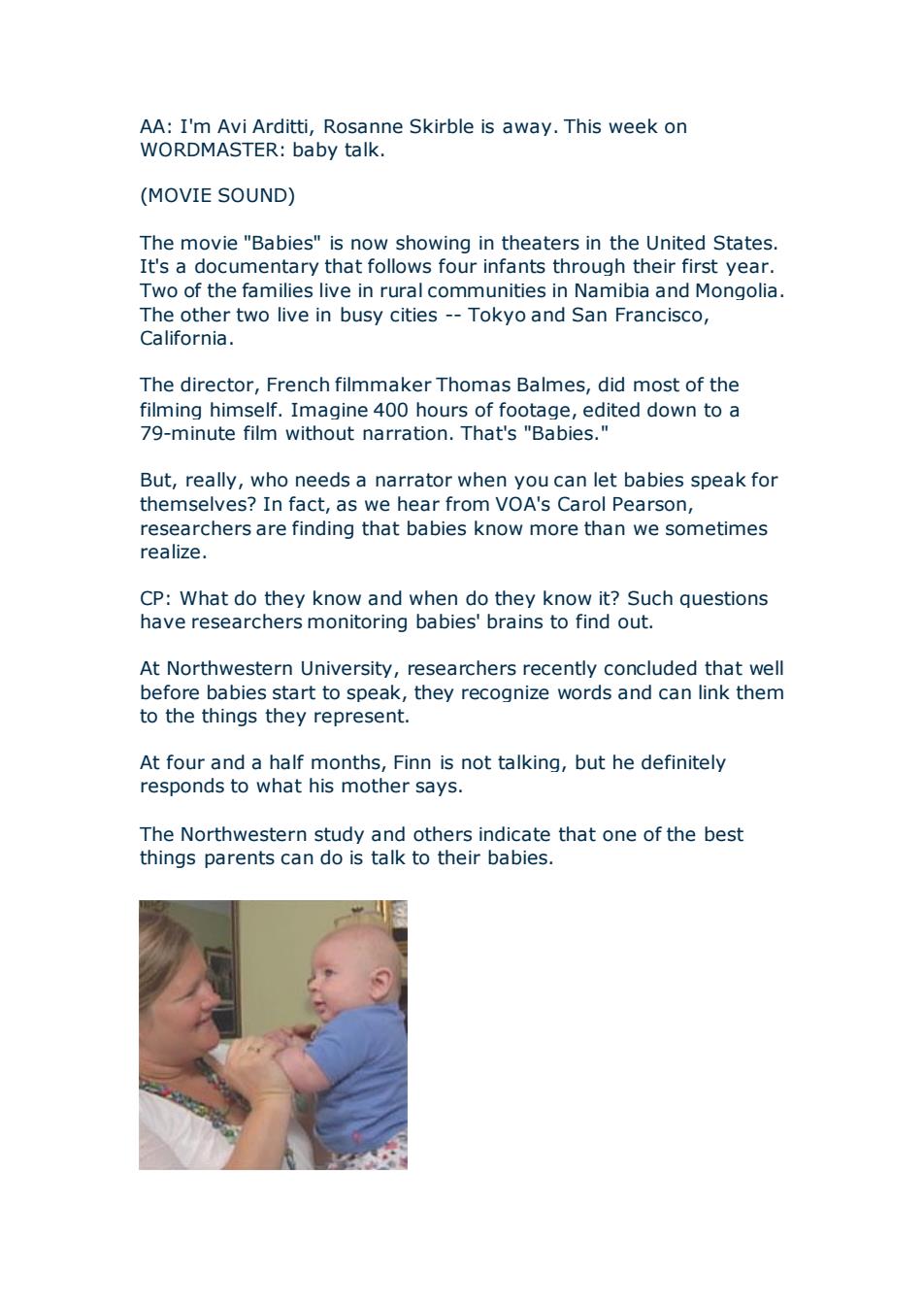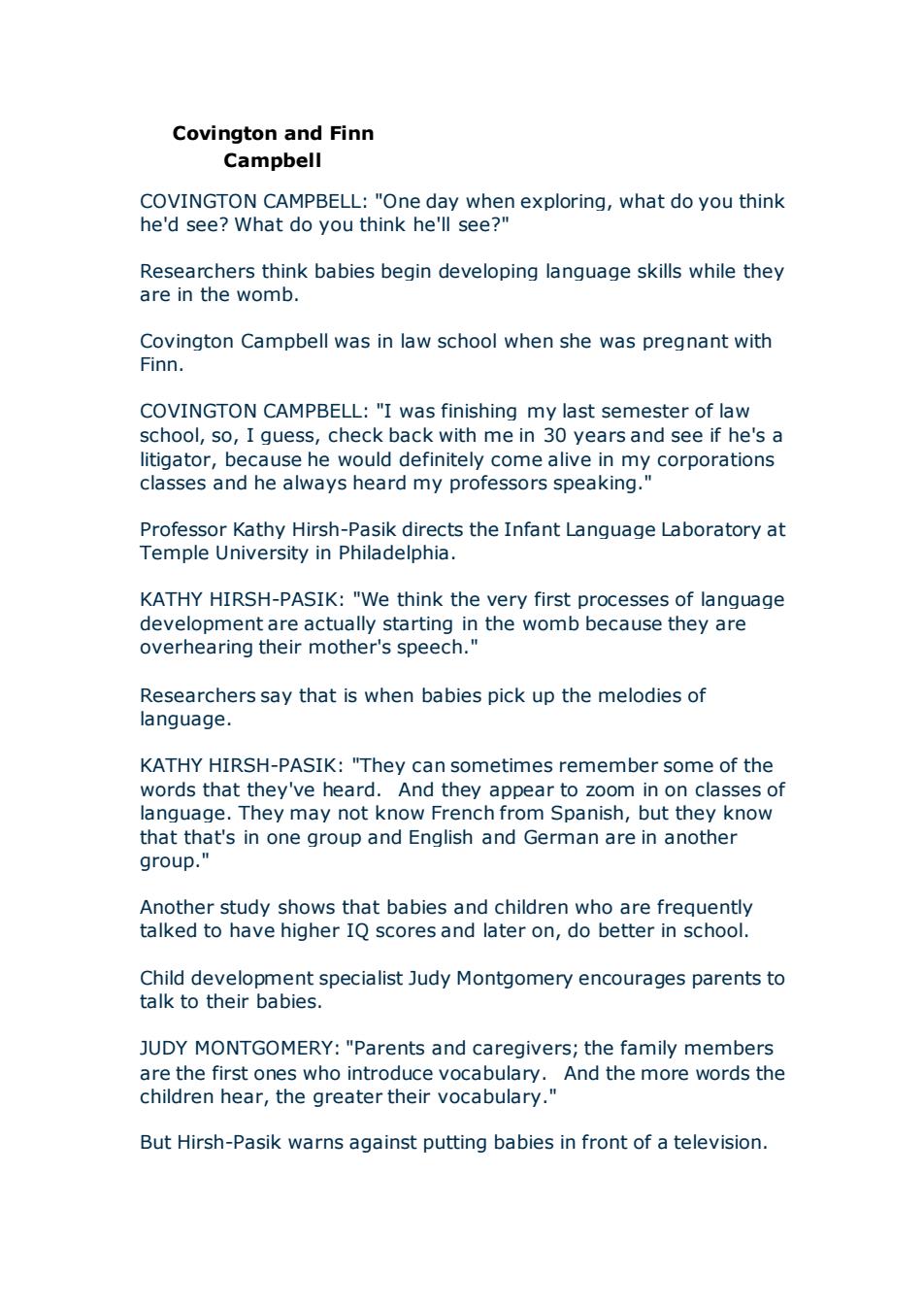
AA:I'm Avi Arditti,Rosanne Skirble is away.This week on WORDMASTER:baby talk. (MOVIE SOUND) The movie "Babies"is now showing in theaters in the United States. It's a documentary that follows four infants through their first year. Two of the families live in rural communities in Namibia and Mongolia. The other two live in busy cities --Tokyo and San Francisco, California. The director,French filmmaker Thomas Balmes,did most of the filming himself.Imagine 400 hours of footage,edited down to a 79-minute film without narration.That's "Babies. But,really,who needs a narrator when you can let babies speak for themselves?In fact,as we hear from VOA's Carol Pearson, researchers are finding that babies know more than we sometimes realize. CP:What do they know and when do they know it?Such questions have researchers monitoring babies'brains to find out. At Northwestern University,researchers recently concluded that well before babies start to speak,they recognize words and can link them to the things they represent. At four and a half months,Finn is not talking,but he definitely responds to what his mother says. The Northwestern study and others indicate that one of the best things parents can do is talk to their babies
AA: I'm Avi Arditti, Rosanne Skirble is away. This week on WORDMASTER: baby talk. (MOVIE SOUND) The movie "Babies" is now showing in theaters in the United States. It's a documentary that follows four infants through their first year. Two of the families live in rural communities in Namibia and Mongolia. The other two live in busy cities -- Tokyo and San Francisco, California. The director, French filmmaker Thomas Balmes, did most of the filming himself. Imagine 400 hours of footage, edited down to a 79-minute film without narration. That's "Babies." But, really, who needs a narrator when you can let babies speak for themselves? In fact, as we hear from VOA's Carol Pearson, researchers are finding that babies know more than we sometimes realize. CP: What do they know and when do they know it? Such questions have researchers monitoring babies' brains to find out. At Northwestern University, researchers recently concluded that well before babies start to speak, they recognize words and can link them to the things they represent. At four and a half months, Finn is not talking, but he definitely responds to what his mother says. The Northwestern study and others indicate that one of the best things parents can do is talk to their babies

Covington and Finn Campbell COVINGTON CAMPBELL:"One day when exploring,what do you think he'd see?What do you think he'll see?" Researchers think babies begin developing language skills while they are in the womb. Covington Campbell was in law school when she was pregnant with Finn. COVINGTON CAMPBELL:"I was finishing my last semester of law school,so,I guess,check back with me in 30 years and see if he's a litigator,because he would definitely come alive in my corporations classes and he always heard my professors speaking." Professor Kathy Hirsh-Pasik directs the Infant Language Laboratory at Temple University in Philadelphia. KATHY HIRSH-PASIK:"We think the very first processes of language development are actually starting in the womb because they are overhearing their mother's speech. Researchers say that is when babies pick up the melodies of language. KATHY HIRSH-PASIK:"They can sometimes remember some of the words that they've heard.And they appear to zoom in on classes of language.They may not know French from Spanish,but they know that that's in one group and English and German are in another group." Another study shows that babies and children who are frequently talked to have higher IQ scores and later on,do better in school. Child development specialist Judy Montgomery encourages parents to talk to their babies. JUDY MONTGOMERY:"Parents and caregivers;the family members are the first ones who introduce vocabulary.And the more words the children hear,the greater their vocabulary. But Hirsh-Pasik warns against putting babies in front of a television
Covington and Finn Campbell COVINGTON CAMPBELL: "One day when exploring, what do you think he'd see? What do you think he'll see?" Researchers think babies begin developing language skills while they are in the womb. Covington Campbell was in law school when she was pregnant with Finn. COVINGTON CAMPBELL: "I was finishing my last semester of law school, so, I guess, check back with me in 30 years and see if he's a litigator, because he would definitely come alive in my corporations classes and he always heard my professors speaking." Professor Kathy Hirsh-Pasik directs the Infant Language Laboratory at Temple University in Philadelphia. KATHY HIRSH-PASIK: "We think the very first processes of language development are actually starting in the womb because they are overhearing their mother's speech." Researchers say that is when babies pick up the melodies of language. KATHY HIRSH-PASIK: "They can sometimes remember some of the words that they've heard. And they appear to zoom in on classes of language. They may not know French from Spanish, but they know that that's in one group and English and German are in another group." Another study shows that babies and children who are frequently talked to have higher IQ scores and later on, do better in school. Child development specialist Judy Montgomery encourages parents to talk to their babies. JUDY MONTGOMERY: "Parents and caregivers; the family members are the first ones who introduce vocabulary. And the more words the children hear, the greater their vocabulary." But Hirsh-Pasik warns against putting babies in front of a television

KATHY HIRSH-PASIK:"Children need the interactive back-and-forth. We call it 'reciprocity." Campbell says she likes to sing to her baby. COVINGTON CAMPBELL:"He smiles a lot when we sing to him.He definitely reacts to it,it sort of calms him down a little bit." Carol Pearson,VOA News
KATHY HIRSH-PASIK: "Children need the interactive back-and-forth. We call it 'reciprocity.'" Campbell says she likes to sing to her baby. COVINGTON CAMPBELL: "He smiles a lot when we sing to him. He definitely reacts to it, it sort of calms him down a little bit." Carol Pearson, VOA News